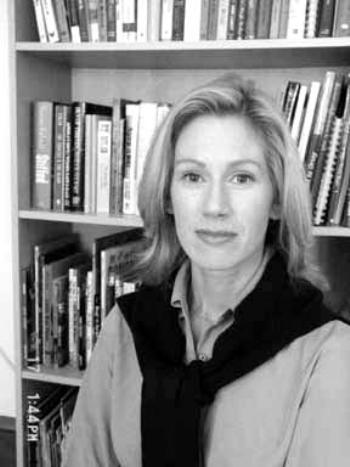
News
Harvard Medical School Cancels Student Groups’ Pro-Palestine Vigil

News
Former FTC Chair Lina Khan Urges Democrats to Rethink Federal Agency Function at IOP Forum

News
Cyanobacteria Advisory Expected To Lift Before Head of the Charles Regatta

News
After QuOffice’s Closure, Its Staff Are No Longer Confidential Resources for Students Reporting Sexual Misconduct

News
Harvard Still On Track To Reach Fossil Fuel-Neutral Status by 2026, Sustainability Report Finds
Niemans Include First Online Journalist

When the Nieman Foundation for Journalism Fellows arrived on campus this fall, they included—for the very first time—an Internet journalist.
Lisa Stone, formerly an editor at Women.com, says she will study how news websites can be made more interactive and how the Internet can “reinvgorate the relationship between audience and the news,” a relationship that she says has been lagging in recent years.
“We as journalists cannot present our coverage in the traditional way that we have,” Stone says. “It comes across as difficult to use or as a poor substitute for the traditional media—no matter how good the content is.”
Over the last five years, about three-quarters of Nieman fellows have been reporters or editors from print media, but the mix changes year to year and often includes photographers, television producers and radio correspondents.
The Nieman Foundation has never had an online journalist before, but nothing in the foundation’s criteria for fellows rules out reporters from online media outlets, says Nieman Curator Robert H. Giles.
“Online is simply a delivery mechanism,” he says. “Our role is to evaluate the journalistic experience these people have had and measure them against other candidates.”
“We didn’t think that was necessarily something to be considered a negative,” Giles says of Stone’s background in online journalism.
The Nieman Foundation is not the only media institute on campus where Internet journalists are hard to come by. The Shorenstein Center on the Press, Politics and Public Policy has set out to find online journalists for its fellowship program, which invites journalists, scholars and government figures to Harvard to study how the news media influences policymaking.
But despite recruiting efforts, the Center has never had an Internet journalist in its fellowship program, says program administrator Edith M. Holway.
Holway says she has tried unsuccessfully to get reporters from Slate, Salon and other websites to apply for Shorenstein fellowships. But online journalists are reluctant to leave a fast-moving industry during slow economic times.
“We’d love to have them, and they know it,” she says. “It’s that the individuals are afraid to take the time off. They might not have a job for them [when they come back]. These are times when it’s very hard for journalists to keep jobs.”
If Internet journalists do apply for Shorenstein fellowships, she says, the new and unsettled nature of their profession makes picking fellows for the prestigious posts more difficult.
“I think it’s still hard to get around what is good journalism,” she says. “I think we would be very selective in that area.”
Out of nearly 100 nominees last year, the Nieman Foundation received no applications from online reporters from mainstream news organizations. And the foundation, which promotes the fellowships on its website and in media industry magazines, is not making a special effort to recruit Internet journalists.
“It’s our belief that the places that we do advertise and make information about the Nieman Fellows [available] reach large numbers of journalists,” Giles says.
Stone says she got lucky with the timing of her fellowship. She had already planned to leave Women.com because she says the site’s recent merger with iVillage, another women’s site, had “buried” its focus on hard news.
Stone started out in print journalism, working for several papers in the San Francisco Bay area. She moved to CNN in 1995 and worked there for two years before moving to Internet journalism. At Women.com, she was the lead editor of the site’s original content, managing the site’s staff of 20 producers.
During her year at Harvard, Stone plans to talk with Kennedy School of Government, Harvard Business School and MIT experts and study marketing data about how people use news websites.
She cites statistics that women are getting more of their news from the Internet than from traditional media sources as evidence that Internet media need to think about what kind of news women are looking for at websites.
The question, she says, is, “Why women are taking seven hours a week away from TV, magazine and radio—when we know the top sites include a lot of news sites.”
Since the Internet makes it easy for people to buy products and communicate with others, she says news websites should focus more on what she calls “service journalism.”
For example, Stone says an “ideal page” about new RU-486 research would show readers where they could obtain the “morning-after” pill and show where to go for more information about research. Since RU-486 is a controversial topic, Stone’s ideal web story would also link to pro and con sites, as well as showing users how to get in touch with their representatives and senators.
Stone says she has not planned beyond her year with the Nieman Foundation, conceding that she is part of the “dot-com dead pool.”
“The ’70s came back and so will the Internet,” she says, “so I am very interested to see what opportunities are available and what promises to be an important 12 months for news media online and off.”
—Staff writer Andrew S. Holbrook can be reached at holbr@fas.harvard.edu.
Want to keep up with breaking news? Subscribe to our email newsletter.
